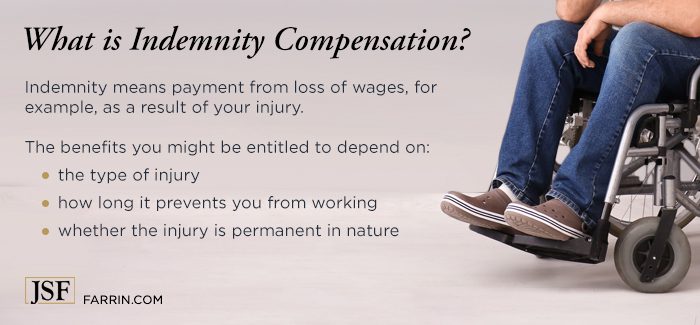I’ve represented a lot of injured workers in my 10+ years as a North Carolina worker’s compensation lawyer. One of the top three questions I am asked when speaking with a new client is whether they are entitled to receive benefits for pain and suffering associated with their injury.
The simple answer is, like most states, North Carolina worker’s compensation laws do not provide pain and suffering benefits for injured workers.
But I advise them to take heart. All is not lost.
There are other benefits available under the North Carolina worker’s compensation legal system that provide for losses injured workers suffer. It’s a matter of semantics. While these benefits are not specifically earmarked as “pain and suffering,” clients can potentially receive compensation for things other than their injuries.
But before we get into what pain and suffering is, let’s talk about what you can get paid for.
The benefits available under North Carolina Worker’s Compensation laws are intended to cover medical expenses to treat injuries from work accidents and wages lost as a result of the work injury. In the worker’s comp world, we generally call these benefits “medical compensation” and “indemnity compensation.”
Getting Paid for Medical Compensation
Medical compensation is intended to cover all the medical benefits that are reasonable and necessary and related to a workers’ compensation injury. If your employer or their insurance company agree that they are responsible for your injury, then they are responsible for paying the medical bills.
These medical benefits cover your expenses fully (nothing out of your pocket) and there are no co-pays or deductibles as with private health insurance. They will even reimburse you for gas money to and from your appointments (but don’t expect them to necessarily tell you that up front).
Additionally, medical compensation can cover future medical expenses associated with the injury once you have healed from the original injury. However, there are lots of twists and turns associated with what employers could be responsible for paying.
What is Indemnity Compensation?
Indemnity means payment from loss of wages, for example, as a result of your injury. Once you have healed, if your injury is permanent, there is a benefit available for that permanent injury. The types of benefits you might be entitled to in indemnity compensation can be highly variable depending on the type of injury, how long it prevents you from working, and whether the injury is permanent in nature.
We urge anyone who is having indemnity compensation issues with their workers’ comp insurance company to contact one of our worker’s comp attorneys.
What Does Pain and Suffering Mean?
Pain and suffering is a physical or mental pain or discomfort stemming from your injuries. It could be that you can’t sleep at night because your slipped disc keeps you up from pain. This could cause you to trudge through your days, tired, short-tempered, less cognitively alert. You may have stopped your morning workout routine due to the injury and lack of sleep. Maybe your marriage is suffering as a result, and your family life, too. Anything that has decreased your enjoyment of life as you knew it before the accident can qualify as pain and suffering. Maybe you’ve had to stop volunteering or taking classes because you’re in pain, tired all the time, and can’t focus.
But, you reason, this is not the real you. You only became this tired, grouchy, depressed, constantly-in-pain person as a direct result of the accident you suffered at work. You should be compensated for this very real quality-of- life loss.
Good point. But here’s the trade-off as the workers’ comp system sees it.
Why Can’t I Get Paid for Pain and Suffering?
Workers’ comp was designed to resolve claims between injured workers and their employers quickly and efficiently.
Employees don’t have to prove their employers were at fault, so that makes it easier for them to obtain workers’ compensation benefits. That’s good news for the employee.
On the other hand, the trade-off is that employer compensation is usually limited to payments for medical bills and wage loss – not such nebulous things as pain and suffering, which could open a can of worms and leave a lot of room for interpretation and “he said she said.”
However, an experienced workers’ comp attorney can help you classify your issues to pursue potential payment from legally defined and acceptable options.
For example, if your injuries have developed into a mental or emotional disorder, you might be able to recover for this through worker’s comp. If, for example, you were diagnosed with depression as a result of dealing with all the issues mentioned in the scenario above, you may be able to receive benefits. However, these are potentially considered separate grounds for filing worker’s comp claims and recovering benefits. We urge anyone who finds themselves in this scenario to contact a worker’s comp lawyer.
There are other avenues to pursue compensation for your injuries, too. Avenues you should explore with us (or any knowledgeable workers’ comp attorney):
- Defective products. If there’s evidence that a defective product caused your injury, we could sue for products liability against the manufacturer of the product. Were you driving a vehicle with a Takata airbag, for example?
- Toxic substances. Sometimes injured workers can be compensated by bringing a tort lawsuit against the manufacturer of the toxin. Think asbestos exposure and mesothelioma.
-
- Was your employer’s conduct intentional and substantially certain to cause serious injury or death of an employee? If we can prove that, we can file a personal injury lawsuit against them.
- You could also bring a personal injury lawsuit against a third party if, for example, you were making a work delivery and were hit by another vehicle.
- If your employer does not carry workers’ comp insurance, you could potentially sue your employer for that. With very few exceptions, The North Carolina Workers’ Compensation Act requires that all businesses that employ three or more employees carry workers’ compensation insurance.
Are you beginning to see why we urge injured workers to contact an experienced North Carolina worker’s compensation lawyer? There are so many nuances in workers’ compensation law – too many for the average person to know and understand.
An NC Board Certified Worker’s Compensation attorney can try to make sure that you receive all the workers’ compensation benefits you may be entitled to. Out of the 28,000 lawyers licensed in North Carolina, only 140 claim that designation in worker’s compensation law.5 And we have seven of them who practice right here at the Law Offices of James Scott Farrin.
Get a FREE Case Evaluation From NC Workers Comp Lawyers
If you are injured in a work accident, we strongly urge you to contact a worker’s compensation attorney to determine whether you have received all the benefits you may deserve. Your health, your job, and possibly, future benefits could be at stake.
Contact us online or call us at 1-866-900-7078 for a free evaluation of your case.
P.S. If you think you can’t afford to hire a qualified workers’ comp attorney consider this. At the Law Offices of James Scott Farrin, we work on a contingency basis, so you don’t owe us an attorney’s fee if we don’t get you compensation for your claim.2
You May Also Be Interested In
Workers’ Compensation Laws in (NC) North Carolina: What’s Covered
Trying to Get Workers’ Comp Payment for Secondary Injuries or Side Effects
What Is My Workers’ Comp Case Worth?
5Figures provided by the N.C. State Bar as of December, 2016.



